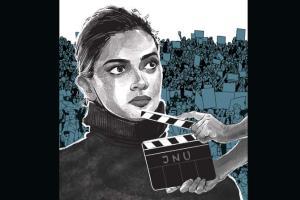Stars hold a mythic meaning for us, embodying through a persona, the currents of the culture

Illustration/ Uday Mohite
![]() Since Deepika Padukone went to the JNU protests, it is amusing to see her described as heroic and also a great actor. You have only to see Chhapaak, her first film as a producer to know that while Deepika is an uneven actor, she is definitely, something more significant in popular culture: a star.
Since Deepika Padukone went to the JNU protests, it is amusing to see her described as heroic and also a great actor. You have only to see Chhapaak, her first film as a producer to know that while Deepika is an uneven actor, she is definitely, something more significant in popular culture: a star.
ADVERTISEMENT
Stars hold a mythic meaning for us, embodying through a persona, the currents of the culture. Stars and the public, exist in a dynamic relationship, like lovers, reflecting and reshaping each other.
Deepika's persona has always been, as this column has previously noted, one of decency and sincerity, even noble of heart. Her presence communicates a self-possessed, reflective and emotional quality. She has frequently played characters who are forthright, ethical and loving. Upright, but not unyielding, who feel deeply, hurt keenly but are willing to heal from hurt—whether in Jawani Deewani, Chennai Express, Piku or Love Aaj Kal.
This is the fundamental quality which illuminates Chhapaak. This is not a 'great' film, lacking strong cinematic qualities, with a basic script that can't quite create narrative momentum or emotional causality, garnishing turning points with dialogue, but not taking us along with them experientially. And yet, Chhapaak has something that has been sorely missing from the cultural mainstream: deep sincerity, even humility, that does not tip over into self-serving earnestness.
Many people have said that it is very brave of Deepika to do "such a role" as if it is dangerous for a beautiful woman to play a disfigured one. But Deepika's pluckiness lies elsewhere.
Despite its limitations, Chhapaak is constantly disturbing. We feel the horror of everyday violence sharply. Without innuendo, sensationalism or euphemism, without aestheticised violence, it conveys the terror, the horror, the pain of being attacked, shunned, heartbroken and defeated. It manages, on the whole, to avoid the pitfalls of presenting its central character, Malati, as pathetic victim and then soaring hero. We encounter her half-way through her recovery process. In avoiding a linear tale of lost normalcy or innocence, which is vanquished, it compels us to deal with a person in the present moment, living, struggling, desiring.
But, throughout, we feel this pain for every woman who appears in the film—Malati does not become a proxy for all women, but exists in a community of women. Those victims who die, and those who survive to strive with the women who support or help them, all make up this world, which spends little time on sociological or psychological explanations for acid attacks.
It is significant and new for a movie star to play one among many, heroism as everyday comradeship, not larger than life. That Deepika went to JNU because she had a film coming out may be true. But it's also true that the film and her persona reflect the times. After a period of deep cynicism, misogyny and self-interest, we are surrounded by earnest passions, which strive for co-existence without subsuming difference; a heartfelt, hospitable politics in response to a politics of corrosive masculinised violence. In this moment, the citizen is the star, and offers the movie star a chance to be a citizen too, not only a brand, reframing celebrity. In the visit to JNU, the star and public mirrored each other. She was welcomed, and easy as one among many. Citizen Deepika, a star for the age.
Paromita Vohra is an award-winning Mumbai-based filmmaker, writer and curator working with fiction and non-fiction. Reach her at paromita.vohra@mid-day.com
Catch up on all the latest Mumbai news, crime news, current affairs, and also a complete guide on Mumbai from food to things to do and events across the city here. Also download the new mid-day Android and iOS apps to get latest updates
 Subscribe today by clicking the link and stay updated with the latest news!" Click here!
Subscribe today by clicking the link and stay updated with the latest news!" Click here!







